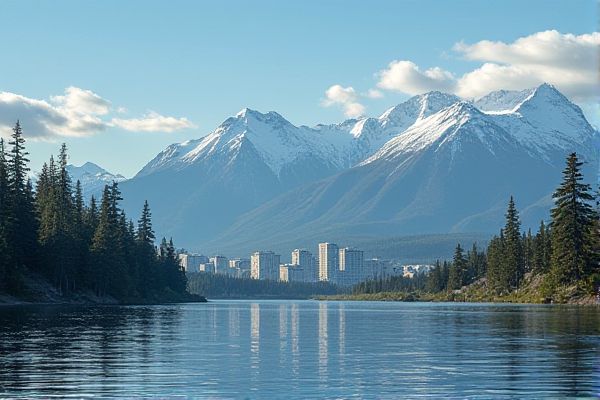
Local laws and regulations in Alaska: Subsistence fishing rights for residents. Wildlife protection laws enforcement. Marijuana is legal for adults 21+. Strict alcohol regulations in villages. Hunting licenses and permits required. Land use regulated through zoning laws. Firearm possession follows federal guidelines. Property taxes vary by borough. Motor vehicle emissions testing. Public utilities regulated by state commission.
Subsistence fishing rights for residents.
Subsistence fishing rights in Alaska are safeguarded by the Alaska National Interest Lands Conservation Act (ANILCA), which enforces a subsistence fishing preference for rural residents, especially Alaska Natives, and restricts the State of Alaska from meddling with federally protected subsistence rights. To qualify for subsistence use fishing, residents must have a minimum of 12 consecutive months of residency. This type of fishing is administered separately from personal use fishing, potentially necessitating specific permits and compliance with regional regulations. For more information, you can visit the detailed explanation on Subsistence Fishing Rights.
Wildlife protection laws enforcement.
In Alaska, the enforcement of wildlife protection laws is primarily the responsibility of the Alaska Department of Public Safety's Division of Alaska Wildlife Troopers, who monitor and enforce regulations related to fisheries, wildlife, and habitat protection, including preventing illegal harvesting and protecting native species from invasive species. Additionally, the U.S. Forest Service's Law Enforcement and Investigations (LEI) team enforces federal subsistence wildlife and fisheries regulations on National Forest System lands, particularly focusing on protecting customary and traditional harvesting by rural Alaskans. To learn more about their efforts and initiatives, you can visit the official website of the Alaska Department of Fish and Game.
Marijuana is legal for adults 21+.
In Alaska, adults 21 years and older are legally allowed to possess up to one ounce (28 grams) of marijuana, cultivate up to six plants (with no more than three mature and flowering), and purchase marijuana from state-licensed retail stores. However, public consumption is prohibited, and there are specific regulations regarding the use and possession of marijuana in various settings, including private properties and workplaces. To understand these regulations more comprehensively, individuals are encouraged to stay informed about the state's cannabis laws and ensure compliance to avoid legal repercussions.
Strict alcohol regulations in villages.
In Alaska, strict alcohol regulations in villages are governed by the "local option" laws, which allow communities to restrict or prohibit the sale, importation, and possession of alcoholic beverages through a petition and election process. Communities can choose to be "dry" (prohibiting all alcohol), "damp" (allowing limited amounts), or impose other specific restrictions, with the state tracking purchases and enforcing limits, especially in rural areas. For detailed information on these regulations and their impact on local communities, visit the Alcohol Local Option page managed by the Alaska Department of Commerce.
Hunting licenses and permits required.
To obtain a hunting license in Alaska, hunters must be at least 18 years old and complete a hunter education course if born after January 1, 1986. It is also essential to purchase the appropriate license based on residency status and target species. Additional permits or tags are necessary for specific game such as moose, caribou, or bear. For more detailed instructions on this process, you can visit the comprehensive guide provided by How to Get a Hunting License in Alaska.
Land use regulated through zoning laws.
In Alaska, land use is heavily regulated through zoning laws, with specific districts and regulations governing various activities such as commercial and industrial use, multifamily development, earth material extraction, and residential development, among others, to ensure compliance with Borough and Municipal Regulations.
Firearm possession follows federal guidelines.
In Alaska, firearm possession largely follows federal guidelines, requiring individuals to be 18 years old to purchase shotguns or rifles and 21 years old to purchase handguns, with additional state-specific restrictions on minors, felons, and certain locations such as schools and courthouses. For comprehensive details on the regulations and restrictions, please visit the Alaska Bar Association website. Understanding these laws is crucial for ensuring compliance and safety within the state.
Property taxes vary by borough.
Property taxes in Alaska vary significantly by borough, with rates determined by local assessments and budgetary needs. For example, Anchorage has a high rate of 1.41%, while the Kenai Peninsula Borough has a much lower rate of 0.70%, reflecting the diverse approaches to local governance and revenue collection across different boroughs. For more detailed information on this topic, visit the Alaska Property Tax Calculator to explore how these rates may impact individual homeowners.
Motor vehicle emissions testing.
In Alaska, motor vehicle emissions testing is governed by Title 18, Chapter 52 of the Alaska Administrative Code, which requires periodic inspections for vehicles in designated Inspection and Maintenance (I/M) areas. It mandates repairs by certified mechanics and outlines specific procedures and standards for emissions testing and certification. For more detailed information, you can refer to the Alaska Administrative Code, which comprehensively covers the regulations that ensure vehicles comply with environmental standards.
Public utilities regulated by state commission.
The Regulatory Commission of Alaska (RCA) regulates public utilities under Alaska Statutes Title 42, ensuring safe, efficient, and reliable services at just and reasonable rates. The RCA sets annual regulatory cost charges, certifies utility providers, and oversees rates, terms, and conditions for public utility and pipeline services.
